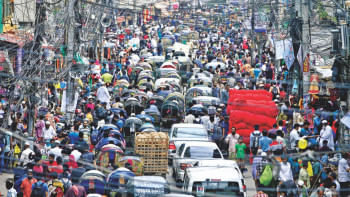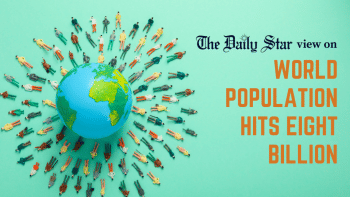Collective effort can make eight billion dreams come true

The world population has reached eight billion people. By 2050, we will be approaching 10 billion people. Almost half of all the people in the world live in China, India, United States, Indonesia, Pakistan, Nigeria, and Brazil. In spite of where a person lives, each and every one of those eight billion people deserve a good future and decent standard of living. The question is, whether everyone can get equal opportunity to live in peace, with dignity, access to social justice, equality, infrastructure, health, security, education, and housing? Is there any person or organisation that will stand with the millions of vulnerable people, and address the existing large-scale hunger, violence, human rights violation, and convince the global leaders to establish a new global order to address these issues?
Today, we have 1.2 billion people in 111 developing countries, who live in acute multi-dimensional poverty. The world has been helplessly watching the number of international migrants growing (people residing in a country other than their country of birth) to almost 272 million. Climate change is exacerbating flooding and drought, and food insecurity could affect up to six million people in Sudan and Somalia. Conflict and civil unrest have spread throughout Myanmar since the military took power, displacing 220,000 people during 2021, in addition to the more than 330,000 people already internally displaced. Driven by conflict, we are seeing over 7.2 million people (over 60 percent of the population) face crisis or increased levels of food insecurity, and 100,000 people facing catastrophe levels in South Sudan.
Afghanistan could see near universal poverty (97 percent) by the end of 2022. Conflict, pandemic, the climate crisis, and rising costs of goods and services have combined in 2022 to create problems for up to 828 million hungry people across the world. A total of 49 million people in 49 countries are teetering on the edge of famine. Globally, an estimated 736 million women, almost one in three, have been subjected to physical and/or sexual intimate partner violence, non-partner sexual violence, or both at least once in their life. Coming to the global disease burden (apart from several infectious diseases killings thousands of our fellow planet members everyday), the number of deaths from heart disease increased by more than two million since 2000, to nearly nine million (16 percent of total deaths from all causes) today. Deaths from diabetes increased by 70 percent globally between 2000 and 2021, with an 80 percent rise in deaths among males. Tobacco kills more than eight million people each year. More than seven million of those deaths are the result of direct tobacco use while around 1.2 million are the result of non-smokers being exposed to second-hand smoke. Over 80 percent of the world's 1.3 billion tobacco users live in low- and middle-income countries.
Globally, there have been 645 million of confirmed Covid-19 cases, including 6.6 million deaths. Moreover, the invasion of Ukraine is causing a massive humanitarian crisis. In addition to the pain and suffering experienced by those inside Ukraine, there are already more than three million people seeking refuge in neighbouring countries, with similar numbers displaced within Ukraine. These data speak for themselves, as to what the state of the world is today.
Our world looks increasingly more divided today, and unless we bridge the yawning chasm between the global haves and have-nots, we are setting ourselves up for more tensions and mistrust, more crisis and conflict. Mistrust, conflict and crisis are killing billions of dreams. If we try to bridge the gaps, we find meaningful outcomes served on a table. If we underscore everything that is undermining confusion and miscommunication, we will succeed in overcoming these global problems. Out of the eight billion people, if eight billionaires desire, they can make a big difference to wipe out hunger in the world. There is also a need for sustainable, climate-resilient agriculture and the need to promote building of thriving rural communities capable of feeding their people. Rising population is not just a number, it also leads to increased pressure on the planet. It is not just our population that has increased to eight billion; it's also our livestock, which needs feeding, our vehicles that need resources, etc.

Apart from working to fix the demand side of the problem, that is to produce enough food for the existing eight billion, the world also needs to work on controlling the population growth. In countries where there is good gender equality, where there is access to family planning and rights and choices, we have seen that populations naturally stabilises. This is where, China, India, United States, Indonesia, Pakistan, Nigeria, and Brazil must focus for next 10-20 years. Apart from making modern contraception legal, free and available everywhere, including remote areas, there is also a strong need to improve rural healthcare systems to reduce infant and child mortality, restrict child marriage, raise the legal age of marriage and, most importantly, legalise abortion without restriction or social stigma. Making the dreams of eight billion people come true will be difficult, but it can be done through collective efforts.
Sachi Satapathy is director, AF Development Care, New Delhi. Email: [email protected]

 For all latest news, follow The Daily Star's Google News channel.
For all latest news, follow The Daily Star's Google News channel. 










Comments